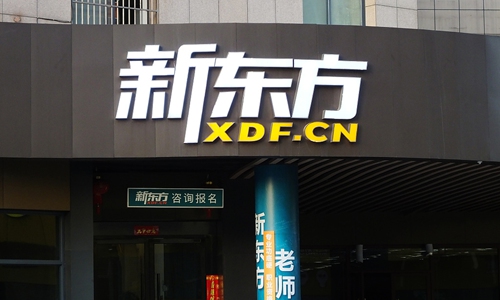
New Oriental Photo: CFP
Shares of Koolearn, an online education company under New Oriental Education and Technology Group Inc, saw its price jump by 100 percent compared with the beginning of November, following rescue actions taken by founder Yu Minhong.
According to data from the Hong Kong Stock Exchange, Yu increased his shares in Koolearn for two consecutive days on November 17 and 18, involving a total of nearly HK$25 million ($3.21 million).
Shares of Hong Kong-listed Koolearn jumped 11.07 percent to HK$9.43 in the morning trading session on Tuesday as of press time. Shares of New Oriental Education & Technology Group, also listed in Hong Kong, rose 4.52 percent to HK$18.02.
The move of increasing shareholding ratio came after Yu's announcement in early November that the company will establish a platform to sell agricultural products through livestreaming sessions in which he and hundreds of teachers will participate, in order to support rural revitalization and help local farmers increase their professional skills.
Meanwhile, the company decided to donate around 80,000 school desks and chairs to rural schools across the country and closed about 1,500 teaching locations due to its business adjustment.
Since Chinese authorities rolled out "double reduction" policy in July in a bid to ease the burden and anxiety for students and implemented a range of measures regulating the private tutoring industry, China's private education companies have been adjusting their business structure and exploring new growth opportunities.
The stock rebound, mainly boosted by the founder's purchase move, also reflected that the capital market has begun to change their attitude toward New Oriental and its business growth, industry observers said.
At the end of October, New Oriental said in a statement that it plans to cease tutoring services related to students from kindergarten through grade nine at all learning centers across the nation by the end of November.
Related K-9 Academic AST Service accounted for about 50 percent to 60 percent of the company's total revenues for each of the prior two financial years, it said.
